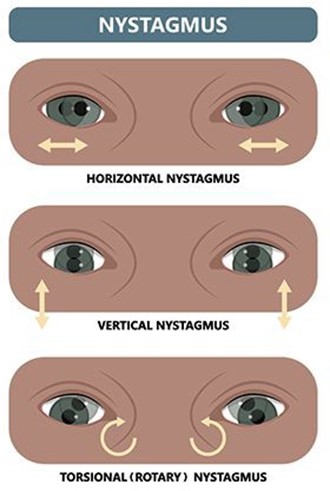You are taking care of a client who suffers from Meniere's disease. On assessment, you note what common symptoms of this disorder? Select all that apply.
Hearing loss.
Nystagmus.
Vertigo.
Tinnitus.
Loss of vision.
Correct Answer : A,C,D
Meniere's disease is a disorder of the inner ear characterized by episodes of vertigo, hearing loss, tinnitus, and a feeling of fullness or pressure in the ear. Nystagmus is not a common symptom of Meniere's disease. Nystagmus is a rhythmic oscillation of the eyes and may be present in other conditions such as vestibular disorders, drug toxicity, or brainstem lesions.
Choice B, nystagmus, is incorrect because although nystagmus can occur in other vestibular disorders, it is not a common symptom of Meniere's disease.
Choice E, loss of vision, is incorrect because Meniere's disease affects the inner ear and does not typically cause vision loss.

Nursing Test Bank
Naxlex Comprehensive Predictor Exams
Related Questions
Correct Answer is B
Explanation
Enuresis. Enuresis is the involuntary discharge of urine after the age at which bladder control should have been established. It is a normal finding for children up to the age of 5 years. Hematuria, Anuria, and Dysuria are abnormal findings related to the urinary system and are not normal findings for a 3-year-old.
Choice A, Hematuria, is incorrect because it is an abnormal finding related to the urinary system.
Choice C, Anuria, is incorrect because it is an abnormal finding related to the urinary system.
Choice D, Dysuria, is incorrect because it is an abnormal finding related to the urinary system.
Correct Answer is A
Explanation
Maintaining optimal bladder emptying. A client with benign prostatic hyperplasia (BPH) may have difficulty urinating due to an enlarged prostate gland. To maintain optimal bladder emptying, the nurse may teach the client to double void, sit down while urinating, and avoid caffeine and alcohol.
Leg exercises, choice B, may be helpful in preventing blood clots but are not directly related to BPH.
Coping strategies, choice C, may be helpful for reducing anxiety but do not address the management of BPH.
Deep breathing exercises, choice D, may be helpful for reducing anxiety but do not address the management of BPH.
Whether you are a student looking to ace your exams or a practicing nurse seeking to enhance your expertise , our nursing education contents will empower you with the confidence and competence to make a difference in the lives of patients and become a respected leader in the healthcare field.
Visit Naxlex, invest in your future and unlock endless possibilities with our unparalleled nursing education contents today
Report Wrong Answer on the Current Question
Do you disagree with the answer? If yes, what is your expected answer? Explain.
Kindly be descriptive with the issue you are facing.
